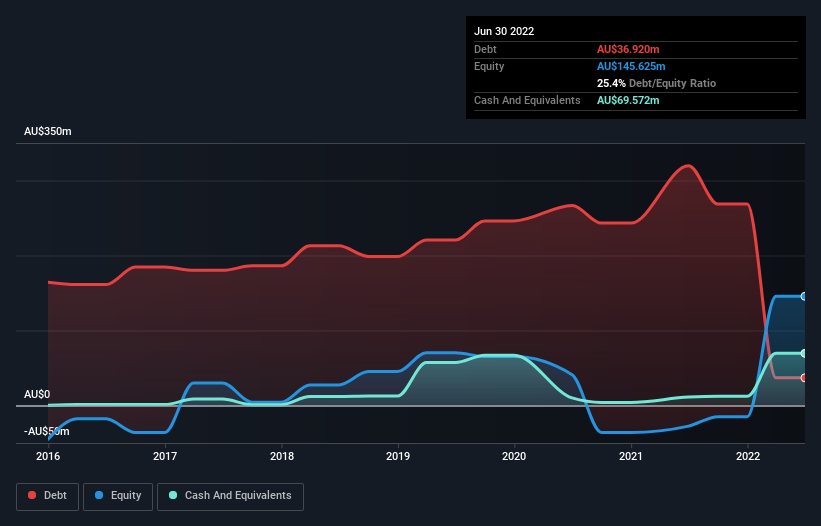
Warren Buffett famously said, 'Volatility is far from synonymous with risk.' It's only natural to consider a company's balance sheet when you examine how risky it is, since debt is often involved when a business collapses. We can see that TerraCom Limited (ASX:TER) does use debt in its business. But the more important question is: how much risk is that debt creating?
What Risk Does Debt Bring?
Debt is a tool to help businesses grow, but if a business is incapable of paying off its lenders, then it exists at their mercy. Ultimately, if the company can't fulfill its legal obligations to repay debt, shareholders could walk away with nothing. However, a more common (but still painful) scenario is that it has to raise new equity capital at a low price, thus permanently diluting shareholders. Of course, the upside of debt is that it often represents cheap capital, especially when it replaces dilution in a company with the ability to reinvest at high rates of return. The first step when considering a company's debt levels is to consider its cash and debt together.
Check out our latest analysis for TerraCom
How Much Debt Does TerraCom Carry?
As you can see below, TerraCom had AU$36.9m of debt at June 2022, down from AU$319.8m a year prior. But it also has AU$69.6m in cash to offset that, meaning it has AU$32.7m net cash.

A Look At TerraCom's Liabilities
The latest balance sheet data shows that TerraCom had liabilities of AU$168.8m due within a year, and liabilities of AU$107.8m falling due after that. Offsetting these obligations, it had cash of AU$69.6m as well as receivables valued at AU$65.6m due within 12 months. So its liabilities outweigh the sum of its cash and (near-term) receivables by AU$141.4m.
Of course, TerraCom has a market capitalization of AU$911.5m, so these liabilities are probably manageable. Having said that, it's clear that we should continue to monitor its balance sheet, lest it change for the worse. While it does have liabilities worth noting, TerraCom also has more cash than debt, so we're pretty confident it can manage its debt safely.
It was also good to see that despite losing money on the EBIT line last year, TerraCom turned things around in the last 12 months, delivering and EBIT of AU$346m. The balance sheet is clearly the area to focus on when you are analysing debt. But it is TerraCom's earnings that will influence how the balance sheet holds up in the future. So when considering debt, it's definitely worth looking at the earnings trend. Click here for an interactive snapshot.
Finally, a company can only pay off debt with cold hard cash, not accounting profits. TerraCom may have net cash on the balance sheet, but it is still interesting to look at how well the business converts its earnings before interest and tax (EBIT) to free cash flow, because that will influence both its need for, and its capacity to manage debt. Over the last year, TerraCom recorded free cash flow worth a fulsome 89% of its EBIT, which is stronger than we'd usually expect. That puts it in a very strong position to pay down debt.
Summing Up
Although TerraCom's balance sheet isn't particularly strong, due to the total liabilities, it is clearly positive to see that it has net cash of AU$32.7m. And it impressed us with free cash flow of AU$308m, being 89% of its EBIT. So is TerraCom's debt a risk? It doesn't seem so to us. When analysing debt levels, the balance sheet is the obvious place to start. But ultimately, every company can contain risks that exist outside of the balance sheet. Case in point: We've spotted 2 warning signs for TerraCom you should be aware of.
Of course, if you're the type of investor who prefers buying stocks without the burden of debt, then don't hesitate to discover our exclusive list of net cash growth stocks, today.
Valuation is complex, but we're here to simplify it.
Discover if TerraCom might be undervalued or overvalued with our detailed analysis, featuring fair value estimates, potential risks, dividends, insider trades, and its financial condition.
Access Free AnalysisHave feedback on this article? Concerned about the content? Get in touch with us directly. Alternatively, email editorial-team (at) simplywallst.com.
This article by Simply Wall St is general in nature. We provide commentary based on historical data and analyst forecasts only using an unbiased methodology and our articles are not intended to be financial advice. It does not constitute a recommendation to buy or sell any stock, and does not take account of your objectives, or your financial situation. We aim to bring you long-term focused analysis driven by fundamental data. Note that our analysis may not factor in the latest price-sensitive company announcements or qualitative material. Simply Wall St has no position in any stocks mentioned.
About ASX:TER
Slightly overvalued with imperfect balance sheet.
Similar Companies
Market Insights
Community Narratives



